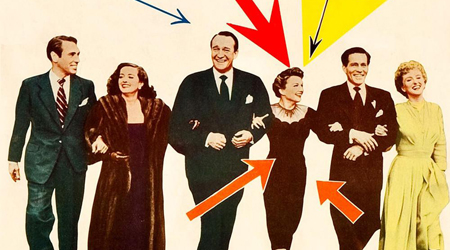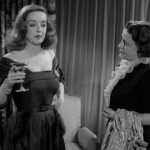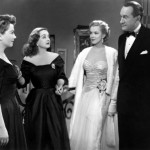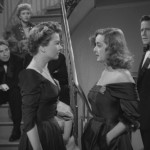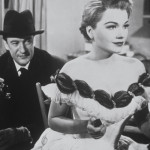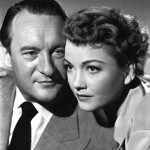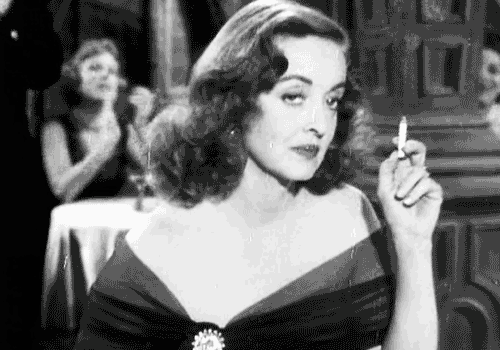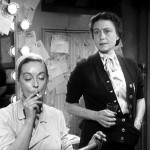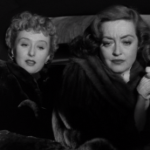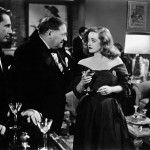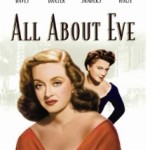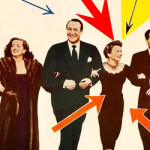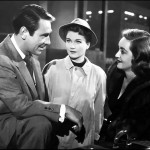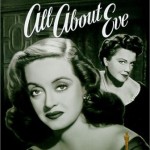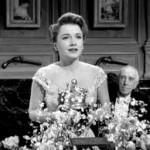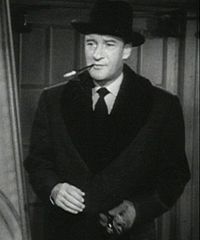There is a scene, the most famous scene in the classic 1950 movie All About Eve, the one at the party where Bette Davis‘s drunken and bitchily vituperative starring actress Margo Channing intones these timeless words:
“Fasten your seat belts, it’s going to be a bumpy night!”
This is the prophetic, touchstone moment for the whole movie, one garlanded with 14 Oscar nominations (winning six) and notable not only for zingingly brilliant acting, but especially for Joseph L Mankiewicz‘s direction and script, he of Sleuth and Guys and Dolls fame, among many others. Unusually, this is one movie that deserves every plaudit, not for how it markets itself but for the product itself.
The script is packed to the gunnels with witty asides and dismissive epigrams worthy of Wilde. In fact, Mankiewicz’s maudlin deconstruction of the roles of critic, writer, director, producer and actor alone are worth the price of admission on their own. Quotes from the script stand on their own as masterpieces of the scriptwriter’s art. For example:
(as Margo orders the pianist to play Liebenstraum for the fifth straight time at Bill’s party while drinking dry martinis in one gulp) Bill Sampson: Many of your guests have been wondering when they may be permitted to view the body. Where has it been laid out? Margo Channing: It hasn’t been laid out, we haven’t finished with the embalming. As a matter of fact, you’re looking at it – the remains of Margo Channing, sitting up. It is my last wish to be buried sitting up. Lloyd Richards: You knew when you came in that the audition was over, that Eve was your understudy, playing that childish little game of cat and mouse. Margo Channing: Not mouse, never mouse. If anything *rat*!
Actually, read the lot. This is not a movie famed for one or two one-line quips but hundreds. Few movies can ever have sustained the power of pointed dialogue for anything like as long as this 138 minutes, though beneath the needle-sharp bitching there is much more than meets the eye. In irony it verges on the film noir of the same era, a very knowing, cynical form of cinema. Yes, it’s overflowing with artifice and two-faced narcissism, but that’s the glitzy, nasty world of showbiz for ya, baby: all for show!
What is most brilliant is that for all the many words spoken, dancing along the continuum between subtle, sardonic and sarcastic, many of the most telling are written in the subtext, the unspoken words the audience can infer from the psychological clues placed before them.
While many of the audience may have taken it at face value, there is very much you can read into All About Eve at different levels. It is this depth that makes it a true classic, the hallmark of a movie of the very highest quality. Consider this, courtesy of Wikipedia:
Critics and academics have delineated various themes in the film. Rebecca Flint Marx, in her Allmovie review, notes the antagonism that existed between Broadway and Hollywood at the time, stating that the “script summoned into existence a whole array of painfully recognizable theatre types, from the aging, egomaniacal grand dame to the outwardly docile, inwardly scheming ingenue to the powerful critic who reeks of malignant charm.” Roger Ebert, in his online review, says Eve Harrington is “a universal type”, and focuses on the aging actress plot line, comparing the film to Sunset Boulevard.
Similarly, Marc Lee’s 2006 review of the film for The Daily Telegraph describes a subtext “into the darker corners of show business, exposing its inherent ageism, especially when it comes to female stars.” Kathleen Woodward’s 1999 book, Figuring Age: Women, Bodies, Generations (Theories of Contemporary Culture), also discusses themes that appeared in many of the “aging actress” films of the 1950s and 1960s, including All About Eve. She reasons that Margo has three options: “To continue to work, she can perform the role of a young woman, one she no longer seems that interested in. She can take up the position of the angry bitch, the drama queen who holds court (the deliberate camp that Sontag finds in this film). Or she can accept her culture’s gendered discourse of aging which figures her as in her moment of fading. Margo ultimately chooses the latter option, accepting her position as one of loss.”
Professor Robert J. Corber, who has studied homophobia within the cultural context of the Cold War in the United States, posits that the foundational theme in All About Eve is that the defense of the norms of heterosexuality, specifically in terms of patriarchal marriage, must be upheld in the face of challenges from female agency and homosexuality. The nurturing heterosexual relationships of Margo and Bill and of Karen and Lloyd serve to contrast with the loveless relationship predation and sterile careerism of the homosexual characters, Eve and Addison. Eve uses her physical femininity as a weapon to try to break up the marriages of both couples, and Addison’s extreme cynicism serves as a model of Eve’s future.
Even film reviewer Kenneth Geist, despite being critical of the emphasis that Sam Staggs’ book All About All About Eve places on the film’s homosexual elements, nonetheless acknowledged that Eve’s lesbianism seemed apparent; specifically, Geist states that “manifestations of Eve’s lesbianism are only twice briefly discernible”. Geist asserted that Mankiewicz “was highly contemptuous of both male and female homosexuals”, although Mankiewicz himself suggested otherwise in an interview in which he argued that society should “drop its vendetta against them”.
Homosexuality was often linked to Communism during the Cold War‘s Lavender Scare and critics have written about film’s subtle, yet central, Cold War narrative. The fair amount of subtlety employed in All About Eve is seen as primarily being due to Production Code restrictions on the depiction of homosexuals in the media during this time. However, notwithstanding those restrictions, Corber cites the film as but one example of a recurrent theme within American film of the homosexual as an emotionally bereft predator. The documentary The Celluloid Closet also affirms this theme to which Corber refers, including citing numerous other film examples from the same Production Code time period in which All About Eve was made.
Another important theme of the film, in terms of war politics and sexuality, involves the post-World War II pressure placed upon women to acquiesce agency. This pressure to resume “traditional” female roles is especially illustrated in this film in the contrast between Margo’s mockery of Karen Richards for being a “happy little housewife” and her lengthy and inspired monologue, as a reformed woman later, about the virtuousness of marriage, including how a woman is not truly a woman without having a man beside her. This submissive and effeminate Margo is contrasted with the theatricality, combativeness, and egotism of the earlier career woman Margo, and the film’s two homosexual characters. Margo quips that Eve should place her award “where her heart should be”, and Eve is shown bereft at the end of the film. At dinner, the two married couples see Eve and Addison in a similarly negative light, with Margo wondering aloud what schemes Eve was constructing in her “feverish little brain”.
Additionally, Eve’s utility as a personal assistant to Margo early in the film, which is a subtle construct of a same-sex intimate relationship, is decried by Birdie, the same working-class character who immediately saw through Eve’s story about a fictional husband. Birdie sees such agency as being unnatural, and the film contrasts its predatory nature (“studying you like a blueprint”) with the love and warmth of her later reliance upon Bill. The pressure to acquiesce agency and more highly value patriarchy, following the return of men from the war, after having been shown propaganda promoting agency such as Rosie the Riveter and after having occupied traditionally male roles such as bomb-building factory worker, was deemed “the problem that has no name” by well-known feminist Betty Friedan.
Despite what critics such as Corber have described as the homophobia pervasive in the movie, All About Eve has long been a favored film among gay audiences, likely due to its campy overtones (in part due to the casting of Davis) and its general sophistication. Davis, who long had a strong gay fan base, expressed support for gay men in her 1972 interview with The Advocate.
In short, this is no longer just a movie but a PhD thesis with a broad context on culture and societal norms, with many arguments about its underlying sympathies, but also yet another example of Hollywood’s awareness of the grim side of showbiz, even if the subject here is on-and-off-Broadway stage productions. This is a truly world-weary and cynical tour de force, a forensic exposé of the back-stabbing behind the glitz, glamour and fixed faux-smiles.
The comparison with Sunset Boulevard is well-made – they are both facets of the same diamond. Indeed, you might say there are many movies cut from the same raw material, including A Star Is Born. Perhaps Swanson’s Norma Desmond, a heroine of the silent era, is further over the hill, while Margo Channing, having just turned 40, is teetering on the brink of ridicule by continuing to play characters much younger than her own years, but they are travelling along the same path towards anonymity and obscurity, which for an egocentric star is the worst of all worlds – to know you are dispensable and will be replaced when you have outlived your usefulness is a living suicide note.
Even the act of George Sanders‘s DeWitt hitting Anne Baxter‘s Eve is emotive, given that at the time it was undoubtedly common practice for husbands to slap their wives, now a signpost to abuse, but in this context it underlines DeWitt’s blackmail statement that he “owns” Eve and can, by implication, manipulate her, do anything he so desires, control her behaviour, prevent her marrying Lloyd, in which plays and movies she performs, and when she will be destroyed as a star by her own ingenue Phoebe, much as she did in turn to Margo.
From being the puppet master pulling the strings, Eve has become the puppet, and later she has become the next Margo Channing. Where do your sympathies lie? In the course of the movie they may change several times, by virtue of the motives and the behaviours of each character, but consider whether the director is manipulating you – are we all puppets, compromised in this game?
While we’re on which subject of ingenues, don’t forget the young Marilyn Monroe appears in All About Eve, which with the benefit of 20:20 hindsight adds several more levels to the millefeuille of irony contained herein. As inspired a casting as you can imagine, and certainly the yang to Channing’s yin.
There is so much to admire in this movie that one sitting is simply not enough. It repays several goes, during which viewings you may re-evaluate it once, twice, maybe more times. A truly marvellous testimony to vintage cinema.

